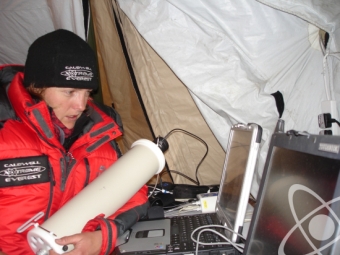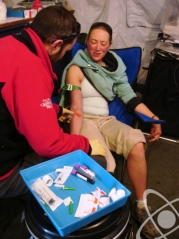
|
|||||||||||||||||||||||||||||||||||||||||||||||||||||||||||||||||||||||||||
Lab work
12 messages :: read> This internet is an amazing thing. Here we are, living in splendid isolation at the top of the breath-taking Khumbu valley, nestled at the shoulder of the highest mountain on earth, and still we are able to have news from the outside world via the internet. Sadly, it seems that the much-anticipated arrival of the internet caf? at EBC is not to be and my only contact with the outside world is via snail-mail and this blog. In this light, I have been very pleased to receive replies to my blog. There does, however, seem to be a widely held misconception that we are on an extended holiday up here. This blog intends to balance the perceptions? There are ten of us on the EBC Science team. Our function is to run 32 subjects over four days per week through a rigorous battery of physiological studies. Kay, in addition to being the external communications officer (it is she I have to thank for facilitating this communication), lends a helping hand and word of encouragement whenever needed in the lab. Mac, whilst not being part of the science team per se, is our EBC manager and heads up the logistics team. He, along with Rhys and Paul, put an amazing amount work into ensuring the smooth running of the camp. They are responsible for power provision for all camp activities, civil engineering as the glacier beneath our camp changes, sanitation and the all important erection of national flag poles. George is our lab manager, and expends much valuable energy running around each testing day ensuring that we have sufficient supplies, sustenance and subjects to make the testing run smoothly. The two Marks share the duties of phlebotomy and neuropsychological testing. In addition to this, Mark Wilson is also the EBC medical officer and runs the pupillometry and retinal imaging.
Nikki encourages our subjects to huff and puff (not an easy past time at 5300m!) to test their lung function in the spirometry study. When Andy Luks is in town doing his study on Hypoxic Pulmonary Vasoconstriction, she also acts as his able-bodied assistant. Jules is running the taste and smell study whilst David Howard is away, which involves getting the subjects to identify a battery of subtle scents through blocked and crusty noses (it?s difficult enough to identify ?skunk? and ?root beer? at sea level, particularly for those of us from east of the Atlantic!) and pops in to help the CPX team. As for me, I run the Cardiopulmonary Exercise testing, along with Jildou, Callan and Jules. This involves getting out of bed at 06h30 with ice still clinging to the tent interior, to get our delicate instruments out of the incubators and allow them to warm up for 1 hour before attempting to calibrate them. As the instruments measure various respiratory physiological parameters of the exercising subjects, they need to be calibrated to pressure, gas concentration. and volume multiple times each day. Whilst these Cortex machines are performing astonishingly well under these harsh conditions (they were originally designed, of course, for use in the clinical setting at sea level), they do require much more TLC up here to make sure they perform at an acceptably high standard for the purposes of our research. Sometimes, this means it takes up to an hour of repeated calibrations for the machine to read correct values. We then put four people on each of two exercise bikes each day, and run them through two different exercise tests. The first is a metabolic efficiency test, which is designed to test the hypothesis that we become more efficient at using oxygen to produce a certain work output under hypoxic conditions. The second is a ramp test, which establishes at what workload the body changes over to anaerobic metabolism, and what the maximum oxygen up take is. It takes between one and a half- to two hours to test each subject, which means that the CPX team is almost invariably the last to leave the lab each evening. In addition to our lab work, we are committed to making our trekkers feel welcome whilst they are with us in EBC. They have their own camp with a separate mess tent. The first night they are in ?town,? we all go down to their mess tent after dinner to meet them, introduce ourselves and explain the running of the testing. The second night that they are with us, we give a presentation on oxygen metabolism (a fitting topic, since our lab is sponsored by the British Oxygen company and oxygen plays a central role in our research). George then gives a talk on the history of the exploration of Everest and high altitude physiology - topics about which he is passionate. Then, on the third and final night of their stay with us, we join the trekkers for a farewell party. This is a grand affair, complete with boxed wine, song and dance. So yes, we are having the most incredible time here at EBC and I am afraid that my time here will be over all too soon (we are now around half way through the expedition). But I hope that I have managed to set your minds at ease that, in addition to the fun and relaxation, there is also a great deal of hard and, I believe, scientifically sound work being done here. Again, many thanks for the blog contact. Until next blog, take care and please do keep the mail coming in? Post a comment on this article...Comments on this article
|
|||||||||||||||||||||||||||||||||||||||||||||||||||||||||||||||||||||||||||
|
| |||||||||
Getting ready for the Christmas Break! read> Talking it up read> Everest Summit Anniversary read> | ||||||||||
|
| ||
|
Other blogs by Gwen Morgan: | |||
|
| ||||||||||||||||||
|
25/04/08: CXE donations to other organisations 8 related images.
29/02/08: Science and Research 17 related images. 04/06/07: More Summit shots 8 related images. | |||||||||||||||||||




